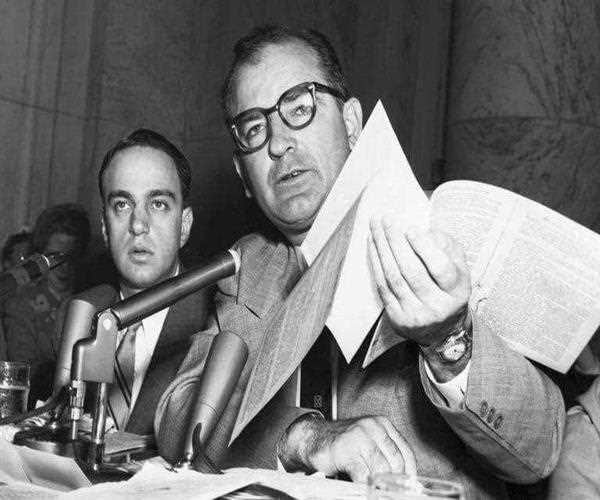*The Downfall of Joseph McCarthy*

Amid the late 1940s and mid-1950s, the possibility of comrade subversion at home and abroad appeared to be startlingly genuine to numerous individuals in the United States. These apprehensions came to define– and, at times, corrode– the period's political culture. For some Americans, the most persevering image of this "Red Scare" was Republican Senator Joseph P. McCarthy of Wisconsin. Congressperson McCarthy put in very nearly five years attempting futile to uncover communists and other left-wing "devotion dangers" in the U.S. government. In the hyper-suspicious climate of the Cold War, suggestions of traitorousness were sufficient to persuade numerous Americans that their administration was pressed with deceivers and spies. McCarthy's allegations were intimidating to the point that few individuals set out to stand in opposition to him. It was not until the point when he assaulted the Army in 1954 that his activities earned him the rebuke of the U.S. Senate.
THE COLD WAR
In the years after World War II finished, occasions at home and abroad appeared to numerous Americans to demonstrate that the "Red hazard" was genuine. In August 1949, for example, the Soviet Union detonated its first nuclear bomb. Soon thereafter, Communist powers proclaimed triumph in the Chinese Civil War and set up the People's Republic of China. In 1950, North Korea's Soviet-sponsored armed force attacked its genius Western neighbors toward the South; accordingly, the United States entered the contention in favor of South Korea.
In the meantime, the Republican-drove House Un-American Activities Committee (known as HUAC) started a decided crusade to extirpate socialist subversion at home. HUAC's objectives included left-wingers in Hollywood and liberals in the State Department. In 1950, Congress passed the McCarran Internal Security Act, which required that all "subversives" in the U.S. submit to government supervision.
JOSEPH MCCARTHY AND THE RISE OF MCCARTHYISM
These variables consolidated to make an air of dread and fear, which demonstrated a ready domain for the ascent of a staunch anticommunist like Joseph McCarthy. At the time, McCarthy was a first-term representative from Wisconsin who had won a decision in 1946 after a crusade in which he censured his adversary's inability to enroll amid World War II while underscoring his own wartime heroics.
In February 1950, showing up at the Women's Republican Club in Wheeling at Ohio County, West Virginia, McCarthy gave a discourse that pushed him into the national spotlight. Waving a bit of paper noticeable all around, he pronounced that he had a rundown of 205 known individuals from the Communist Party who were "working and forming strategy" in the State Department.
The following month, a Senate subcommittee propelled an examination and found no evidence of any subversive action. Besides, a large number of McCarthy's Democratic and Republican partners, including President Dwight Eisenhower, objected to his strategies ("I won't get into the drain with this person," the president told his helpers). In any case, the representative proceeded with his supposed Red-bedeviling effort. In 1953, toward the start of his second term as a congressperson, McCarthy has placed responsibility for the Committee on Government Operations, which enabled him to dispatch much more broad examinations of the affirmed socialist penetration of the national government. In hearing in the wake of hearing, he forcefully cross-examined witnesses in what numerous came to see as a glaring infringement of their social equality. In spite of an absence of any verification of subversion, in excess of 2,000 government representatives lost their employment because of McCarthy's examinations.
THE FALL OF JOSEPH MCCARTHY
When the hearings were finished, McCarthy had lost the vast majority of his partners. The Senate voted to denounce him for his "unpardonable," "indefensible," "obscene and annoying" lead "unbecoming a representative." He kept his activity, however, lost his energy, and passed on in 1957 at 48 years old.
Cheers!